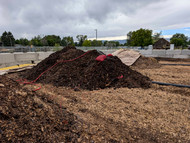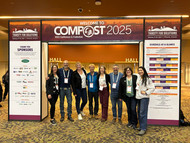Stories
Read all about it. New products, waste diversion success stories, company news - it's all here.
Oct 16th 2025
Eco-Products is helping take compostable packaging research to the next level by providing key funding for the Compostable Field Testing Program (CFTP). This open-source research initiative is focuse
Oct 15th 2025
When Toby Alves talks about his work, he returns often to one word: connection. For him, being a Product & Zero Waste Specialist (PZW) at Eco-Products is about connecting people, industries and i
Oct 15th 2025
Our cups tell a story of nature, sustainability, and connection. Now they look the part even more with fresh colors, new graphics, and interactive storytelling through QR codes.
Q: What’
Oct 1st 2025
We’re still buzzing with inspiration after the 2025 BPI (Biodegradable Products Institute) Summit that took place in Atlanta in September. This annual gathering brings together leaders, innovat
Sep 16th 2025
When stadiums, restaurants, and college dining halls choose to use certified compostable products, this presents a great opportunity to compost both food scraps and compostable foodservice products,





